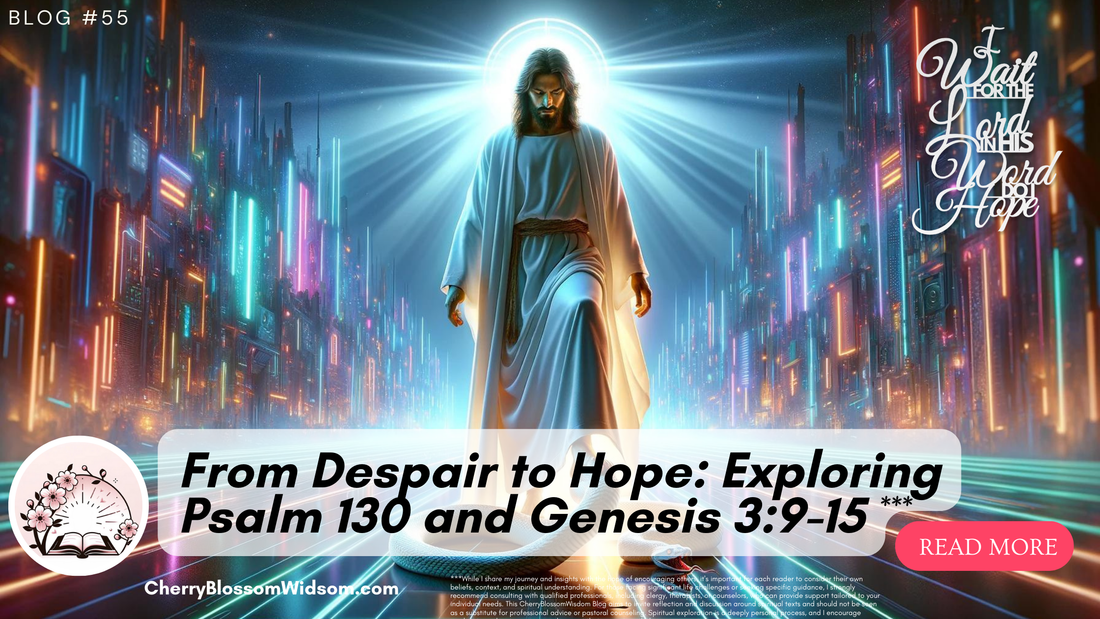"Where art thou? ... I heard thy voice in the garden, and I was afraid, because I was naked; and I hid myself." As I listen to the Lector reading the Sunday first reading from Genesis 3:9-15, I wonder what would be the connection to today's Responsporial Psalm. As the organist sang Responsirial Psalm 130, I felt a deep connection between this Psalm and the First Reading which offers a powerful message of despair, repentance, and hope.
In this blog post, we will explore the profound messages of Psalm 130 and Genesis 3:9-15. By examining the themes of crying out to God in our deepest despair and the consequences of sin, we will uncover the beautiful story of redemption and hope that connects these passages. Understanding these scriptures not only enriches our faith but also provides us with timeless wisdom for navigating the struggles of life. By examining the relationship between Psalm 130 and Genesis 3:9-15, we can gain a deeper appreciation of God's mercy and His plan for our redemption.
As a lay person, my journey with the Bible has been one of constant learning and growth, and it is my heartfelt desire to share these insights with you. This blog represents my personal reflections and interpretations of Psalm 130 and Genesis 3:9-15. It is not intended as expert theological advice, but as a means to encourage and inspire personal study and spiritual growth.
We will begin by exploring Psalm 130 in detail, examining its structure and themes. Next, we will turn our attention to Genesis 3:9-15, understanding the context and implications of "man's fall from grace". Finally, we will draw connections between these passages, offering reflections and questions for journaling that can guide your personal study and meditation.
Psalm 130: A Cry from the Depths
The Plea for Mercy (Psalm 130:1-2)
The psalmist begins with a heartfelt cry from the depths of despair, pleading for God to hear and be attentive. This opening sets the tone for the entire psalm, emphasizing the desperation and earnestness of the plea.
Acknowledgment of Sin (Psalm 130:3-4)
These verses highlight the David’s recognition of human sinfulness and the impossibility of standing before a holy God if He were to mark every iniquity. Yet, there is a profound assurance in God’s forgiveness, which evokes reverence and awe.
Waiting and Hoping in the Lord (Psalm 130:5-6)
Here, David expresses a deep sense of waiting and hoping in the Lord, comparing it to the anticipation of dawn after a long night. This metaphor conveys a sense of trust and expectation in God's promises.



In the spirit of trust and expectation, we've created a beautiful piece of art decor, the Psalm 130:5 I Wait For The Lord available at MysticalCherry.com
If you're interested, check it out. Remember, purchasing through this link may support the blog at no additional cost to you.
Redemption and Hope (Psalm 130:7-8)
The psalm concludes with a call for Israel to hope in the Lord, emphasizing His mercy and abundant redemption. This promise of redemption extends to all, offering hope for deliverance from iniquities.
Genesis 3:9-15: The Fall and Promise of Redemption
The Confrontation (Genesis 3:9-13)
9 And the Lord God called unto Adam, and said unto him, Where art thou? 10 And he said, I heard thy voice in the garden, and I was afraid, because I was naked; and I hid myself. 11 And he said, Who told thee that thou wast naked? Hast thou eaten of the tree, whereof I commanded thee that thou shouldest not eat? 12 And the man said, The woman whom thou gavest to be with me, she gave me of the tree, and I did eat. 13 And the Lord God said unto the woman, What is this that thou hast done? And the woman said, The serpent beguiled me, and I did eat.
In Genesis 3:9-13, we witness the heartbreaking moment when God confronts Adam and Eve after they have eaten from the forbidden tree. The dialogue reveals the immediate consequences of their disobedience: fear, shame, and blame. This passage captures the essence of humanity's fallen state, separated from God and burdened by sin.
The Curse and the Promise (Genesis 3:14-15)
14 And the Lord God said unto the serpent, Because thou hast done this, thou art cursed above all cattle, and above every beast of the field; upon thy belly shalt thou go, and dust shalt thou eat all the days of thy life: 15 And I will put enmity between thee and the woman, and between thy seed and her seed; it shall bruise thy head, and thou shalt bruise his heel.
God's pronouncement of the curse introduces the consequences of sin for the serpent, the woman, and the man. Yet, amid the curse, there is a glimmer of hope in Genesis 3:15. This verse, often referred to as the Protoevangelium, is considered the first gospel, hinting at the future victory of Christ over Satan.
Connecting Psalm 130 and Genesis 3:9-15
The Cry for Mercy and the Fall
Psalm 130 begins with a desperate cry for mercy from the depths of despair, which resonates with the fall of humanity described in Genesis 3. Both passages highlight the reality of human sinfulness and the need for divine intervention.
Forgiveness and Redemption
The assurance of forgiveness in Psalm 130:3-4 aligns with the promise of redemption in Genesis 3:15. Despite the severity of the fall, there is hope in God's mercy and the promise of a Savior who will crush the serpent's head.
Waiting and Hoping
The psalmist's expression of waiting and hoping in the Lord (Psalm 130:5-6) parallels the anticipation of redemption hinted at in Genesis 3:15. This theme of waiting and hoping is central to the believer's journey, as we trust in God's promises for our ultimate deliverance.
Reflections and Questions for Journaling
-
Reflect on Despair and Hope: Consider the depths of despair described in Psalm 130:1-2. Have you ever experienced a similar feeling? How did you cry out to God in that moment, and how did He respond?
-
Acknowledging Sin: Reflect on Psalm 130:3-4. Are there sins in your life that you need to acknowledge before God? How can you embrace the assurance of His forgiveness?
-
Waiting on the Lord: Meditate on Psalm 130:5-6. What does waiting on the Lord look like in your life? How can you cultivate a deeper sense of hope in His word?
-
Understanding the Fall: Reflect on Genesis 3:9-13. How does the story of Adam and Eve’s disobedience resonate with your own experiences of falling short? What can you learn from their response to God’s confrontation?
-
Hope in Redemption: Meditate on Genesis 3:14-15. How does the promise of redemption through Christ give you hope in your own struggles with sin? How can you live in the light of this promise?
From the depths of despair to the heights of hope, Psalm 130 and Genesis 3:9-15 offer a powerful message of God's mercy and redemption. By reflecting on these scriptures, we can gain a deeper understanding of our need for God's forgiveness and the hope we have in His promises.
May these reflections inspire you to seek God's presence in your times of despair, trust in His forgiveness, and live with hope in His redemption plan.


